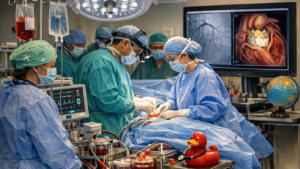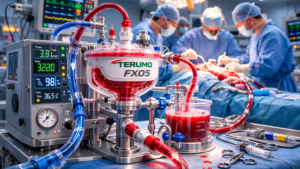Background: Left ventricular assist device (LVAD) candidates are at increased risk of immune dysregulation and infectious complications. To attenuate the elevated proinflammatory cytokine levels and associated adverse clinical outcomes, it has been postulated that extracorporeal blood purification could improve the overall survival rate and morbidity of patients undergoing LVAD implantation. Methods: We retrospectively reviewed prospectively collected data of 15 patients who underwent LVAD implantation at our center between January 2021 and March 2022. Of these, 15 (100%) who received HeartMate 3™ (St. Jude Medical, Abbott, MN, USA) device were eligible. Intraoperatively, patients were single randomized 1:1:1 to three groups: group 1, patients who received Cytosorb therapy (n = 5; installed in the CPB circuit); group 2, patients who received Jafron HA330 (n = 5; installed in the CPB circuit); and control group 3, patients who did not receive filter (n = 5; usual care, neither Cytosorb nor Jafron during CPB). Baseline patient characteristics and intraoperative data were compared between the groups. Blood sample analyses were performed to assess the levels of inflammatory markers (IL-1, 6, 8; CRP, Leukocyte, Lactate, PCT, NT-proBNP, TNF-α) in both preoperative and postoperative data. Results: Baseline patient characteristics were similar in all three groups. We found that IL1α; IL 6; IL8; Lactatedehydrogenase, PCT, pro-BNP, CRP; Leukocyte, and TNFα levels significantly increased with LVAD implantation and that neither Cytosorb nor Jafron influenced this response. In-hospital mortality and overall survival during follow-up were similar among the groups. Conclusion: Our preliminary results showed that hemoadsorption therapy using Cytosorb or Jafron hemoadsorption (HA) 330 may not be clinically beneficial for patients with advanced heart failure undergoing LVAD implantation. Large prospective studies are needed to evaluate the potential role of HA therapy in improving outcomes in patients undergoing LVAD implantation.







